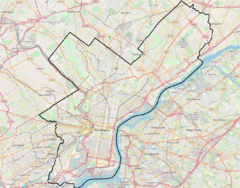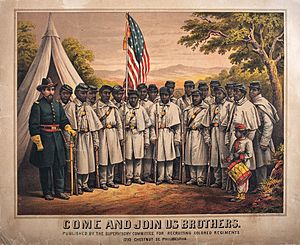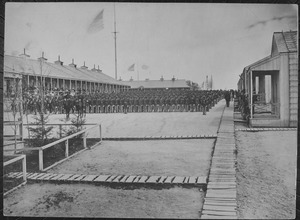Camp William Penn facts for kids
Quick facts for kids Camp William Penn |
|
|---|---|
| Cheltenham Township, Montgomery County, Pennsylvania | |
| Type | training camp |
| Site information | |
| Operator | Union Army |
| Site history | |
| Built | 1863 |
| In use | 1863 - 1865 |
|
Pennsylvania Historical Marker
|
|
| Location | 7322 Sycamore Ave., La Mott, Pennsylvania |
|---|---|
| Nearest city | Philadelphia |
| Coordinates | 40°03′59″N 75°08′32″W / 40.06635°N 75.1423°W |
| Built/founded | 1863 |
| Governing body/ |
Township of Cheltenham, Pennsylvania |
| PHMC dedicated | May 15, 1999 |
Camp William Penn was a special training camp for soldiers during the American Civil War. It was located in Cheltenham Township, Pennsylvania. From 1863 to 1865, this camp was the first place specifically for training African American soldiers. About 11,000 free black men and formerly enslaved people trained here. This included 8,612 from Pennsylvania, which was the most black troops recruited from any northern state during the war.
Contents
Why Camp William Penn Was Created
After President Abraham Lincoln issued the Emancipation Proclamation, many black men wanted to join the Union Army. They wanted to fight for their freedom and prove they were equal citizens. However, black volunteers were often treated unfairly or turned away from joining the army. Camp William Penn was created to be a dedicated training camp just for these "colored troops."
Building the Camp
The land for the camp was leased to the government by the family of Lucretia Mott. She was a famous abolitionist and fought for women's rights. The camp was located in Chelten Hills, just outside Philadelphia. It was first planned to be named after Lincoln's Secretary of War, Edwin M. Stanton. But in the end, it was named Camp William Penn.
Training African American Soldiers
All the soldiers at Camp William Penn were black volunteers. They came from many different states. Lt. Col. Louis Wagner took command of the camp in early 1863. He was recovering from injuries he got in the Battle of Chancellorsville. This camp became the largest training center for African American soldiers in the Union Army.
The camp was fully ready by July 4, 1863. Over its two years of operation, it trained eleven different regiments. This added up to almost 11,000 men.
Challenges and Inspiration
Some people in the local area watched Camp William Penn closely. They worried that black recruits might not follow government rules. When Frederick Douglass, a famous abolitionist, visited the camp, he saw some concerning things. He noticed black recruits being punished for minor military issues. Douglass was deeply troubled because many of these men had already suffered greatly from slavery.
Douglass spoke to the troops, telling them: "You are a spectacle for men and angels. You are in a manner to answer the question, can the black man be a soldier?" He believed that these men could indeed become great soldiers.
Despite their dedication, black troops faced unfair treatment due to racism. Many soldiers complained about how harshly they were treated. Still, Camp William Penn was a very important step forward for African Americans. Colonel Wagner insisted that his black soldiers ignore unfair rules that separated people by race. Confederate soldiers especially disliked commanders of black regiments. If black troops and their commanders were captured, the commanders were often executed along with their men.
Regimental Flags
A famous black artist named David Bustill Bowser designed and painted flags for some of the regiments that trained at the camp. He designed the flag for the 6th United States Colored Infantry Regiment. This flag showed "the Goddess of Liberty holding a flag while encouraging a freedman dressed as a soldier to do his duty." He also designed the flag for the 45th United States Colored Infantry Regiment. This flag showed an African American soldier standing next to a statue of George Washington.
 | Kyle Baker |
 | Joseph Yoakum |
 | Laura Wheeler Waring |
 | Henry Ossawa Tanner |




